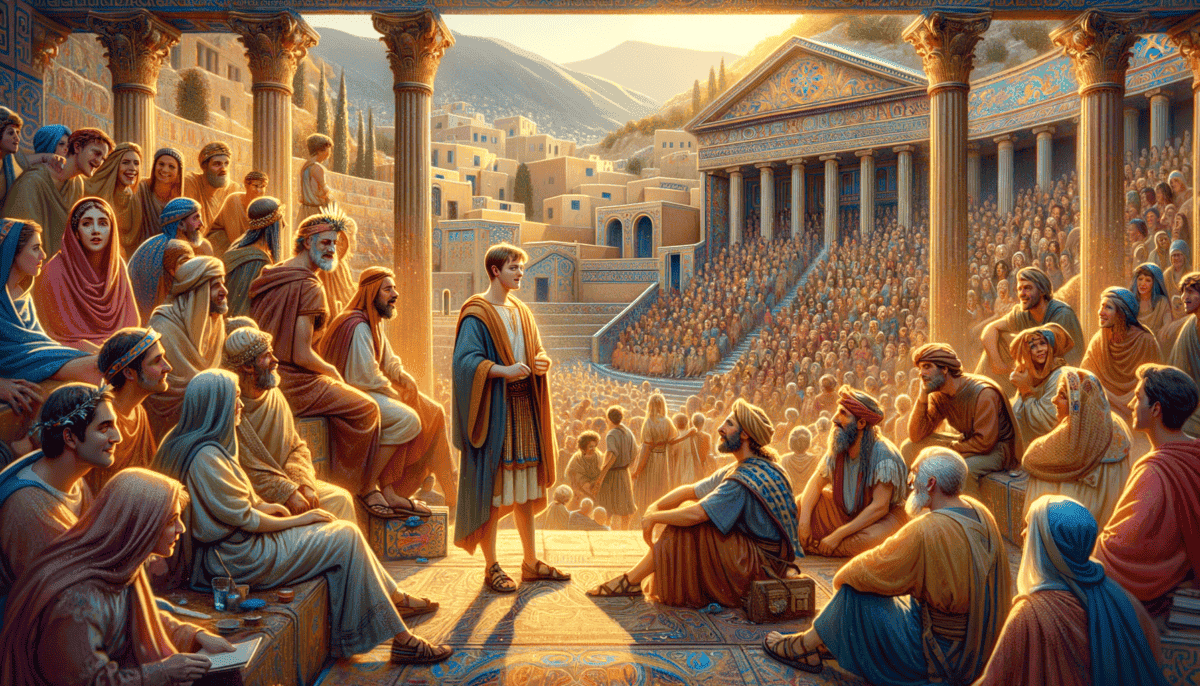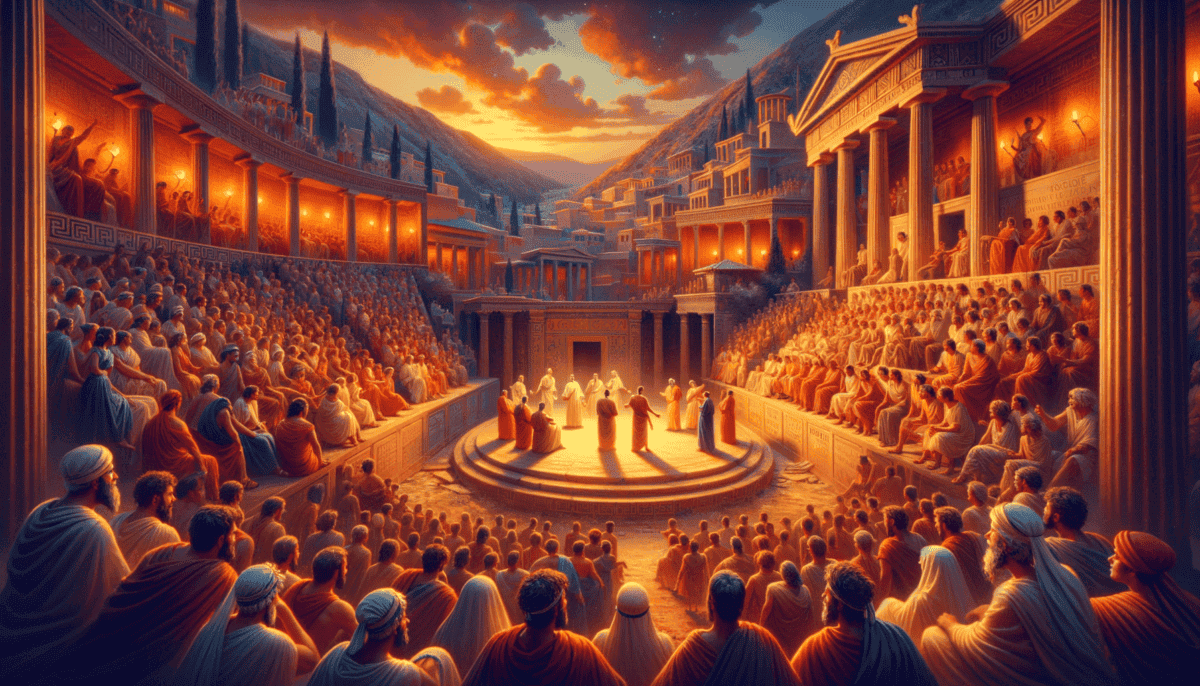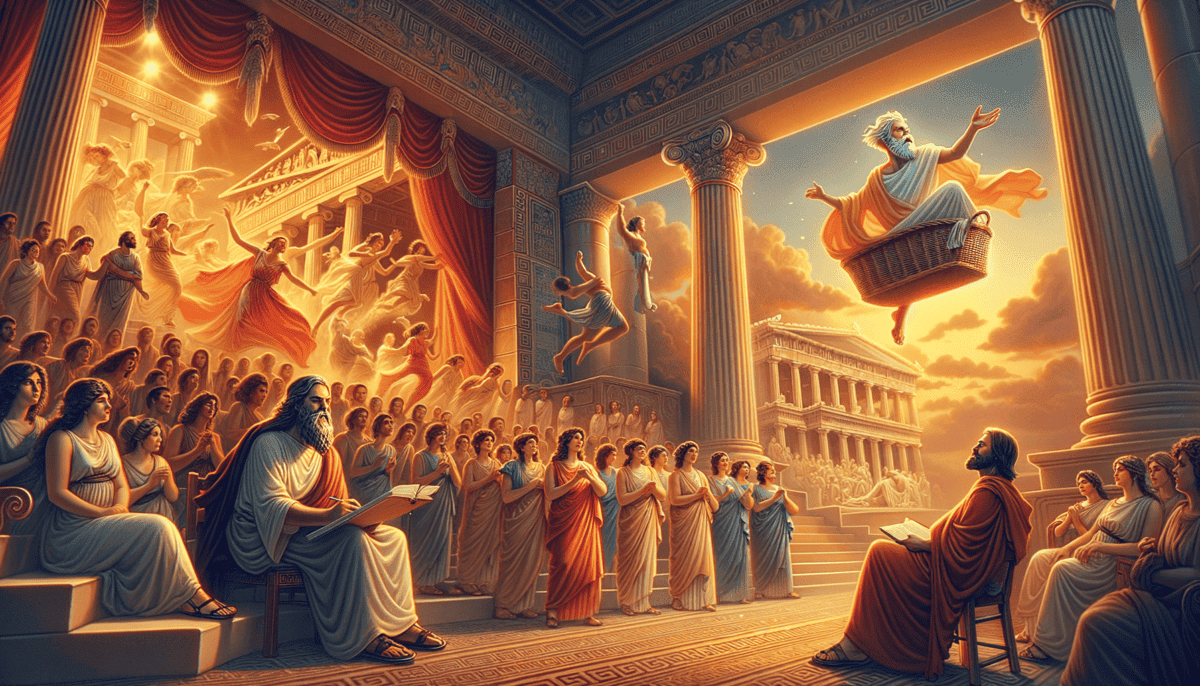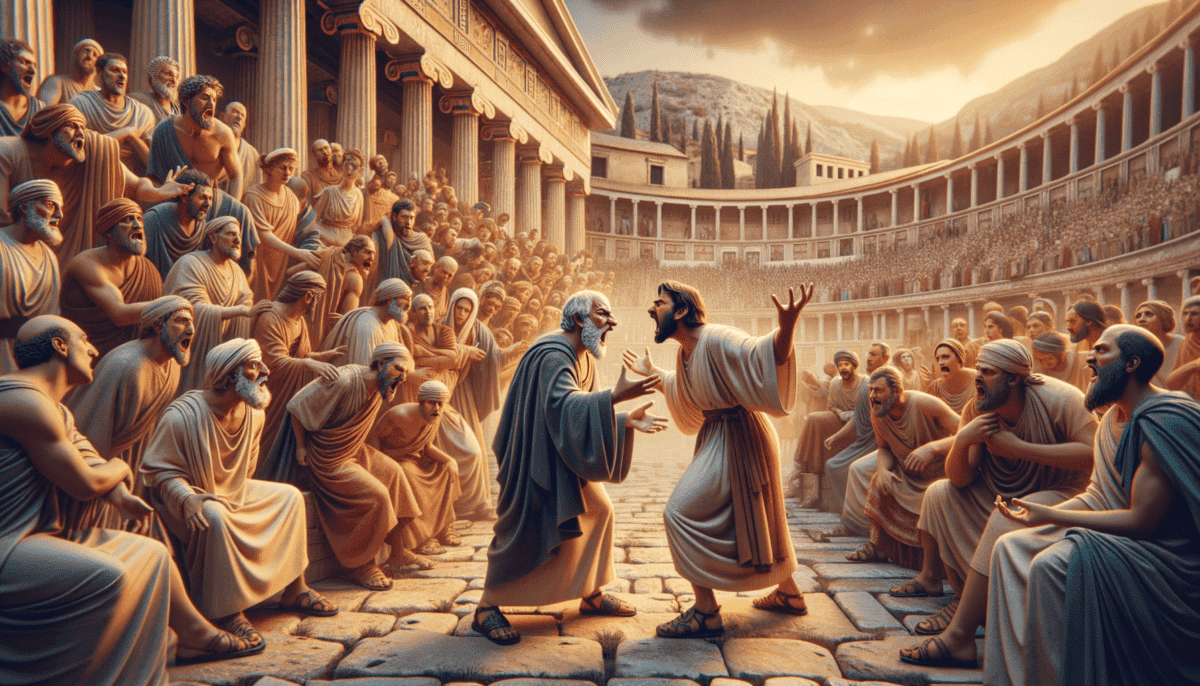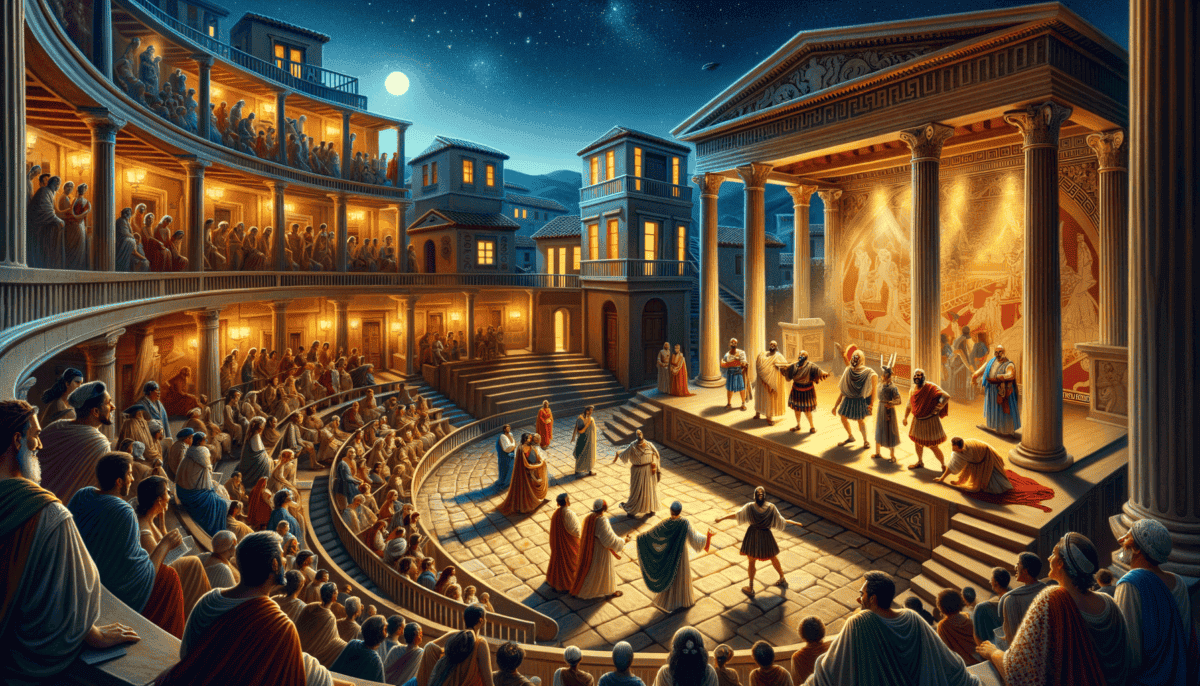The Vibrant World of Athens
The streets of Athens buzzed with excitement! ️ People walked quickly past tall marble buildings and busy markets. The year was 445 BCE, and Athens was the most exciting city in all of Greece.
Young Aristophanes peeked out his window, watching the colorful crowd below. He was just ten years old, but he already loved to make people laugh. His mom always said he had the silliest jokes in all of Athens!
"Look, mother!" Aristophanes pointed at a group of actors setting up a stage in the street. "They're going to do another play!"
His mother smiled. "Yes, dear. Athens loves its theater. Maybe someday you'll write plays too!"
The city was special because it let people share their ideas freely. Writers could make up stories about anything they wanted. Artists could paint whatever they dreamed. And actors could perform silly plays that made everyone giggle!
A City Full of Stories
Every day, Aristophanes would run to the marketplace with his friends. They would watch performers tell funny stories while wearing big, silly masks. The masks had huge smiles or frowns painted on them, and sometimes long, funny noses!
"I want to write plays like that," Aristophanes told his best friend, Theo. "But mine will be even funnier!"
Theo laughed. "You already make everyone laugh with your jokes about the teachers!"
The boys loved watching shows at the big theater of Dionysus. It was built right into a hill, with rows and rows of stone seats. People would come from all over Greece to see the plays there.
Growing Up with Theater
As Aristophanes grew older, he started writing his own little plays. He would put on shows in his backyard with his friends. They used old blankets for costumes and pottery pieces for masks.
"Your son has a special gift," his teacher told his parents one day. "He sees the funny side of everything!"
The streets of Athens taught young Aristophanes something important: laughter could bring people together. Whether they were rich or poor, everyone enjoyed a good joke.
Each night, he would sit by his window, watching the city lights flicker. He dreamed of the day when he would write plays that would make all of Athens laugh. Little did he know, his funny stories would still make people smile thousands of years later!
The theater called to him, just like it called to so many others in Athens. But Aristophanes would do something different – he would create a whole new kind of play. He would invent comedy as we know it today.
The sun set over the Acropolis, casting long shadows across the marble streets. Tomorrow would bring new adventures, new jokes, and new stories to tell. Athens was waiting for its comedy master, and young Aristophanes was ready to answer that call.
The Festival of Laughs
The streets of Athens were extra busy today! People rushed around with flowers and colorful ribbons. It was time for the Festival of Dionysus, the biggest party of the year!
“Wake up, sleepyhead!” Aristophanes’ mother called. “You don’t want to miss the festival!”
A Special Day for Shows
Young Aristophanes ran to the window. He could already hear music playing in the streets. People wore fancy clothes and bright flower crowns. Some even had faces painted like the god Dionysus!
“This is how theater began,” his father explained. “Long ago, people would sing and dance to honor Dionysus. Then they started telling stories too!”
Aristophanes watched as actors set up their stages. Some wore happy masks, others wore sad ones. But his favorites were the funny masks with silly faces that made everyone giggle.
The First Funny Shows
At the festival, Aristophanes learned something new. Before his time, plays were always serious. They were about heroes and gods doing brave things. But then someone had a clever idea – what if plays could be funny?
“Comedy started right here in Athens,” his teacher said. “People realized that laughing together made everyone happy!”
Learning to Write Jokes
Every day after the festival, Aristophanes practiced writing funny stories. He watched how other playwrights made people laugh:
• Some used silly costumes and funny dances
• Others made jokes about daily life in Athens
• The best ones mixed clever words with silly actions
• Everyone loved when actors made funny faces
His friend Theo loved helping him practice. “Tell the one about the grumpy old man again!” he would say.
Finding His Funny Voice
As he grew older, Aristophanes started writing his own special kind of comedy. He didn’t just want to make silly jokes – he wanted to make people think while they laughed.
“Your plays are different,” his teacher said. “They’re funny, but they also say important things about our city.”
The young playwright worked hard every day. He watched people in the marketplace, listened to conversations, and wrote down funny things he saw. Everything could be turned into a joke!
“Remember,” his mother said, “laughter is a gift. Use it wisely!”
The Festival of Dionysus changed everything for Aristophanes. He saw how comedy could bring joy to an entire city. Soon, he would write plays that would make Athens laugh like never before.
As the festival ended, lanterns glowed in the dark streets. Music played softly in the distance. Aristophanes smiled, knowing that his journey to become Athens’ greatest comedy writer had just begun.
Making Athens Laugh
The sun rose over Athens as Aristophanes walked to the theater. Today was special – he would show his first big play!
A Brave New Voice
“Are you nervous?” asked his friend Theo, helping to set up the stage.
“A little,” Aristophanes smiled. “But I think people will like it.”
His first play was called “The Wasps.” It was about a funny judge who loved going to court too much. The story made people laugh, but it also made them think about how Athens worked.
Jokes That Made People Think
Not everyone liked his funny stories about the city. Some important people got mad when he joked about them.
“Because sometimes silly things tell the truth best!” Aristophanes replied.
But most people loved his plays! They were different from other shows because they:
• Made fun of real problems in a funny way
• Used songs and dances that made people laugh
• Had actors wear crazy costumes
• Told jokes that everyone could understand
Facing Big Challenges
Writing funny plays wasn’t always easy. Sometimes Aristophanes stayed up all night thinking of new jokes. Other times, he worried his ideas were too bold.
The City’s New Star
Soon, everyone in Athens knew Aristophanes’ name. People would line up to see his newest plays. Even kids would sing his funny songs in the streets!
“Your son makes Athens a happier place,” neighbors told his parents.
Each new play was bigger and funnier than the last. Aristophanes used clever costumes, silly dances, and smart jokes to tell stories about:
– City leaders who acted silly
– Teachers who talked too much
– People who fought over small things
– Friends who helped each other
A Special Kind of Magic
What made Aristophanes special was how he mixed funny jokes with important ideas. He showed that laughter could make people listen and think in new ways.
“When we laugh together,” he told Theo, “we can talk about anything!”
Even on tough days, Aristophanes kept writing. He knew his city needed both wisdom and laughter. Each play was like a gift to Athens – a way to see problems differently and smile while doing it.
As the moon rose over the theater, Aristophanes watched people leave his latest show. Their happy faces told him everything he needed to know. His brave new way of making comedy was changing Athens, one laugh at a time.
Masterpieces That Changed Athens
The theater buzzed with excitement. Today, Aristophanes would show his most daring play yet – “Lysistrata!”
A Bold New Story
“Will they understand?” asked Maria, who played Lysistrata.
“They will,” Aristophanes smiled. “Sometimes the silliest stories tell the biggest truths.”
The play had everyone laughing! People loved watching the women outsmart the men. But it also made them think about why wars are bad. ️
Making People Think and Laugh
After “Lysistrata” came another big hit – “The Clouds.” This play was extra funny because it made fun of teachers who used big words but didn’t say anything important.
“But can you tell us what makes the rain fall?” asked another.
“Um… the clouds are crying?”
Everyone laughed!
Clever Ways to Tell Truth
Aristophanes used many fun tricks to make his points:
• Funny costumes that made important people look silly
• Songs that got stuck in your head
• Jokes that both kids and adults could laugh at
• Stories that seemed crazy but had smart ideas inside
Standing Up for What’s Right
Some plays were harder to write than others. When Athens was having tough times, Aristophanes used humor to help people feel better.
Making Magic on Stage
Each show was special. In “The Birds,” actors wore colorful feathers and flew around the stage. In “The Frogs,” they hopped and croaked funny songs.
“Your plays make us forget our troubles,” people said.
“No,” Aristophanes would answer. “They help you face your troubles with a smile!”
Changing Hearts with Humor
The best thing about these plays was how they brought people together. Rich and poor, young and old – everyone could laugh at the same jokes.
Night after night, Aristophanes’ plays filled the theater. His funny stories about peace, love, and being smart helped make Athens a better place.
As stars twinkled above the stage, Maria asked, “Will people remember these plays?”
Aristophanes watched the happy crowd leaving the theater. “As long as people need to laugh and think,” he said, “these stories will live on.” ⭐
The Power of Laughter
The sun rose over Athens as Aristophanes walked through the busy marketplace. People smiled and waved – they all knew the funny man who made them laugh!
Speaking Truth with Smiles
“Look, it’s the comedy master!” shouted a young boy.
“Why do you make fun of important people?” asked the boy’s sister.
Aristophanes knelt down and smiled. “Sometimes big people forget to be good. A little laugh can help them remember!”
Brave Funny Man
Writing funny plays about powerful people was dangerous. But Aristophanes knew that jokes could change minds better than angry words.
“Good!” laughed Aristophanes. “Maybe they’ll think about being better leaders!”
Making Athens Better
Here’s how Aristophanes helped his city:
• Made people think about peace instead of war
• Showed when leaders were being silly
• Helped everyone laugh at their own mistakes
• Brought people together with shared jokes
The Magic of Comedy
One day, a group of angry men came to the theater. But by the end of the play, they were laughing with everyone else!
Standing Strong
Some powerful people tried to stop his plays. But the people of Athens loved them too much! They knew his jokes helped make their city better.
“Your plays give us courage,” said a young actor.
“No,” smiled Aristophanes. “You already have courage. My plays just help you find it!”
Spreading Joy
Every new play brought more hope to Athens. People learned they could stand up to bullies with clever words instead of fists.
As the sun set, Aristophanes watched children playing in the street. They were acting out scenes from his plays, giggling and having fun.
“Why do you keep writing plays?” asked a small girl.
Aristophanes picked up a flower and gave it to her. “Because every time we laugh together, the world gets a little bit brighter.”
The stars began to twinkle as he walked home, happy knowing that tomorrow would bring new chances to make people laugh and think.
The Laughing Legacy
Many years have passed, but people still smile when they hear the name Aristophanes. His funny plays live on, making new friends laugh all around the world!
A Gift That Keeps Giving
“Grandpa, tell us about the funny play-writer!” begged a little girl in modern Athens.
“Ah, Aristophanes! He taught us that laughter is like sunshine – it belongs to everyone!”
Stories That Never End
Today, actors still perform his plays in theaters around the world. People dress up in costumes and say his words, just like they did long ago.
What Aristophanes Taught Us
These are the special gifts he gave to the world:
• Showing that jokes can change things for the better
• Teaching us to laugh at ourselves
• Using funny stories to fix big problems
• Proving that laughter brings people together
Comedy Champions Today
Many funny people today are like Aristophanes. They make jokes about things that need to change, just like he did!
Forever Funny
In modern theaters, kids giggle at the same silly scenes that made their great-great-great grandparents laugh. Some things never stop being funny!
“His plays are like treasure boxes,” said a teacher. “Every time we open them, we find new sparkly things inside!”
The Story Lives On
New writers keep learning from Aristophanes. They see how he used jokes to make people think and care about important things.
Today, in a classroom in Athens, a young girl reads one of his plays. Her eyes light up, and she starts to giggle. The magic of Aristophanes still works! ✨
“What makes these old plays so special?” asks her friend.
She smiles and says, “They remind us that sometimes the best way to fix something is to laugh about it together.”
And so, the story of Aristophanes continues. Every new laugh adds another page to his never-ending tale of joy and hope.
The next time you hear someone tell a joke to make things better, remember Aristophanes. He showed us that laughter isn’t just fun – it’s a superpower that can change the world! ♂️


